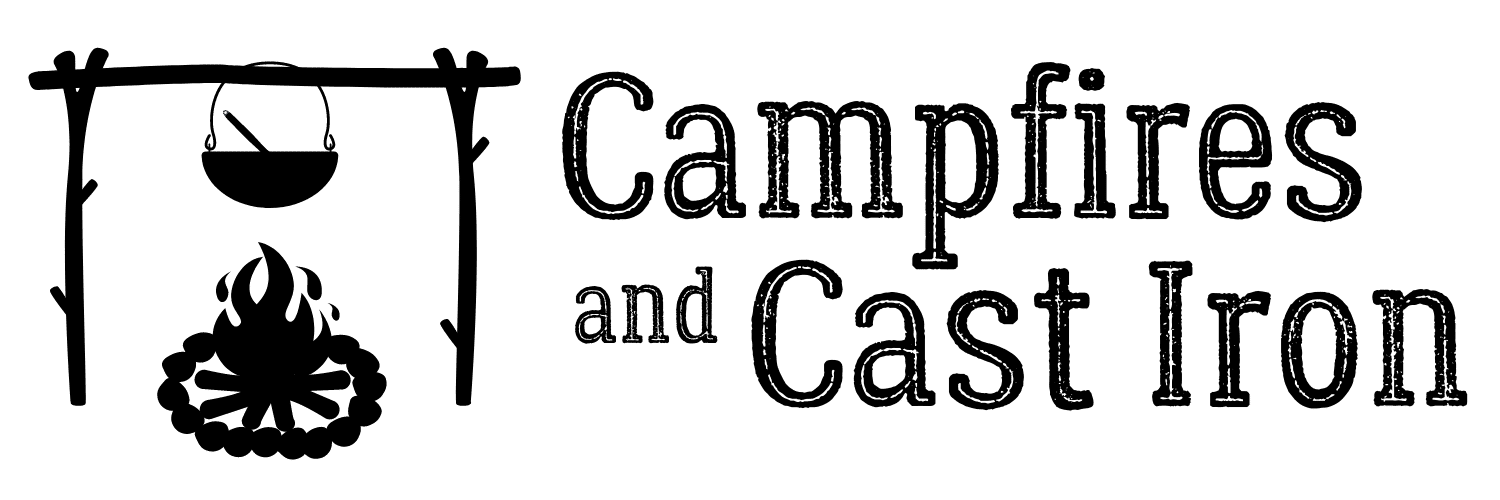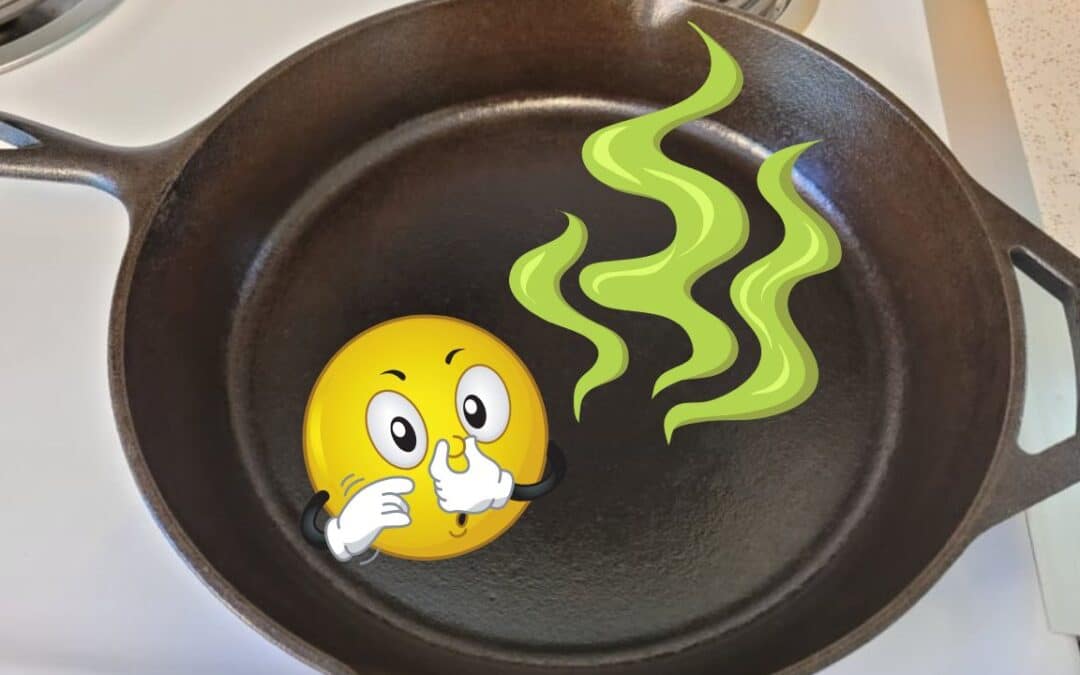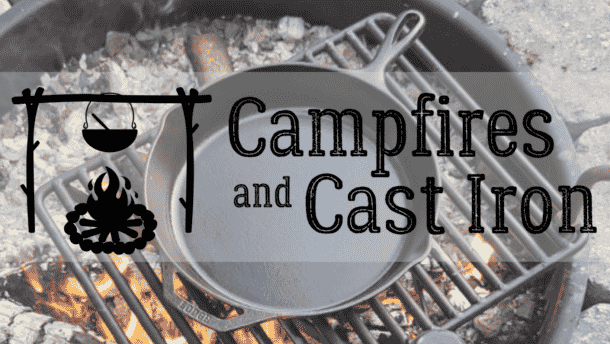Have you ever grabbed your cast iron pan to cook a meal and noticed something…funky? Maybe a lingering odor reminiscent of last week’s fried fish, or a metallic, garlicky smell? Ew. That’s certainly not appetizing. You washed the skillet and oiled it after using it last. So, why does your cast iron smell bad?
A cast iron pan can smell bad due to improper cleaning, being under-seasoned, cooking strong-smelling foods (such as fish or garlic) that create lingering smells, or applying too much oil to the pan prior to storing it. The best way to fix stinky cast iron is by heating it in a 400°F oven for 15 mins.
In the next section, we’ll take a deeper look at the most common reasons cast iron cookware might occasionally smell bad. I’ll also show you the safest and most effective way to fix cast iron odors without damaging the seasoning layer. Plus, a look at cast iron storage solutions and which pan deodorizing “hacks” to avoid.
Why Does My Cast Iron Smell Bad?
Here are the most common reasons your cast iron pan might smell bad. Fortunately, they are all easy to fix!
Cooking Strong-Smelling Food
Leftover odors from pungent foods like fish, garlic, onion, or spices can easily remain in a cast iron pan, even after washing it with soap.
This mainly has to do with the fact that cast iron is a naturally rough and porous material (source), meaning it is not completely solid. On a microscopic level, cast iron is full of tiny holes. Many new cast iron pans are also manufactured with a rough-textured surface. This is different from stainless steel, enameled, or teflon-coated pans, which have a very smooth, non-porous surface.
The textured, unsealed surface of cast iron cookware essentially absorbs tiny amounts of oil and protein from the food you’re cooking, causing lingering smells. This is why having a proper seasoning layer is very important, as you’ll see in the next section.
Your Cast Iron Pan Is Under-Seasoned
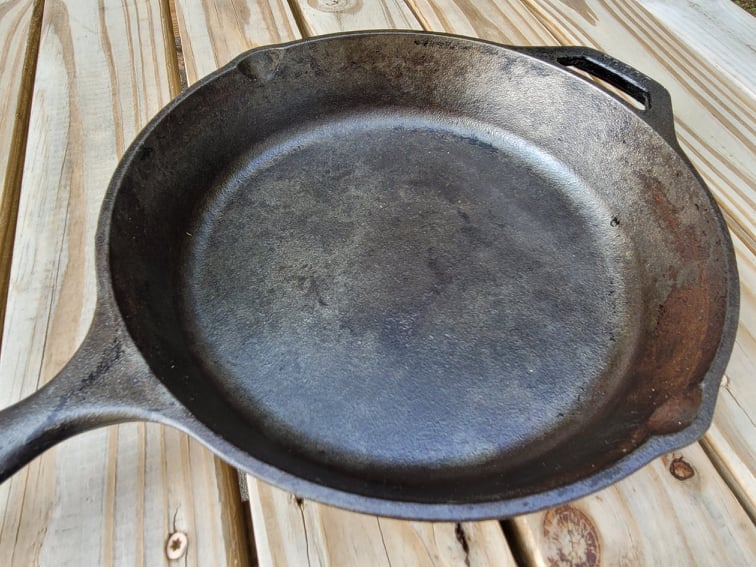
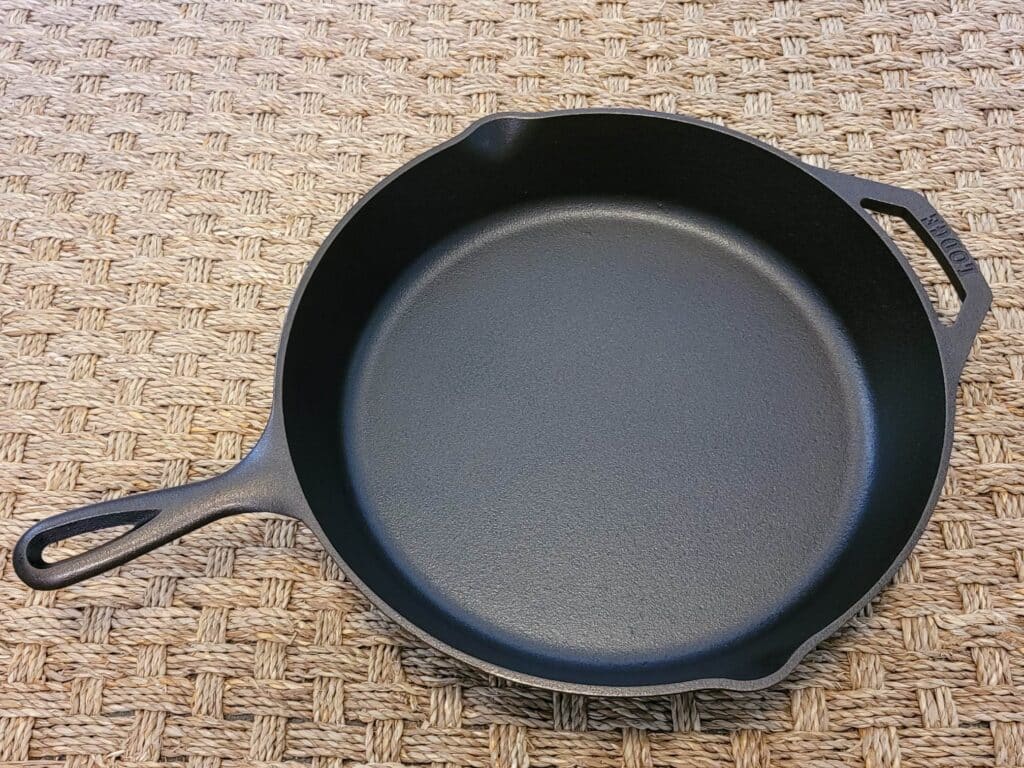
The best defense against lingering food odors is your pan’s seasoning layer. Cast iron seasoning, which is essentially a layer of hardened oil bonded to the pan’s surface through a process called polymerization, acts as a barrier between your food and the iron. This barrier helps prevent oils and microscopic food particles from being absorbed into the iron.
The seasoning layer also protects cast iron pans from rust, which prevents unwanted metallic odors and tastes in food.
For seasoning instructions, check out my handy Cast Iron Seasoning Quick Guide.
Your Cast Iron Is Rusty
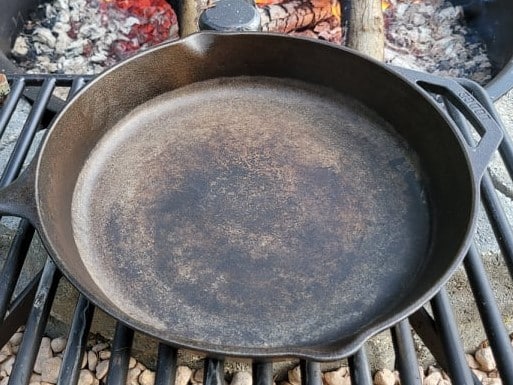
Even a small amount of surface rust can cause cast iron cookware to smell bad. If you’ve ever experienced the musty, metallic odor of rust from old tools, an old car, or even old iron pipes in the basement of a building, you know what I’m talking about.
When iron is exposed to oxygen and moisture, oxidation (aka rust) occurs, along with a distinctive earthy, metallic smell. This smell becomes much more prominent when the pan is heated for cooking.
While a small amount of rust isn’t harmful if ingested, it also isn’t advisable to cook with a pan in this condition. My helpful article, How To Restore Your Pan and Prevent Rust, walks you step-by-step through the process of removing surface rust and re-seasoning your pan.
Your Pan Wasn’t Cleaned Properly
Leaving food scraps, oil, and grease in your cast iron pan overnight can cause lingering odors. It’s best to clean your pan as soon as it is cool enough to handle.
If you’ve cooked a light dish with a minimal amount of oil or grease and no heavy food residue, you can simply wipe out your skillet with a clean, dry paper towel. As long as no crumbs or food residue remains, this is all you need to do.
To clean your cast iron after cooking greasy, strong-smelling foods or when significant food residue remains, wash it with mild dish soap and a non-abrasive scrub brush or sponge. It’s fine to wash cast iron with soap, I promise! Check out my article, How To Safely Wash Cast Iron With Soap, to see which dish soaps are best for cast iron and which ones you should avoid.
Applying Too Much Oil Before Storing Your Cast Iron
This is a very common reason your cast iron might smell bad. If you apply too much oil to your clean pan and don’t thoroughly buff off the excess prior to storing it, the oil will oxidize. This results in a musty, rancid smell. Your pan will probably feel sticky, too.
I have found that certain types of oils are more likely to oxidize and make your cast iron smell bad. Vegetable oil seems to be the worst, along with cheap canola blends. My favorite oils for conditioning and storing cast iron without funky smells are grapeseed and pure, high-quality canola.
To oil your cast iron pans properly before storing them, pour a small amount of oil into the pan. A little bit goes a long way! Use a lint-free cloth or clean kitchen rag to wipe the oil all over the cooking surface. With a clean section of the cloth, buff all the oil off of the pan. Yes, it sounds counter-intuitive, but trust me. Wipe the oil off like you didn’t want it there in the first place. There will still be a super thin layer of oil on the iron – enough to protect it from moisture and rust. Now, when you’re ready to use your pan, it won’t feel sticky or smell stale.
Improper Storage
How and where you store cast iron can also affect the way it smells. For example, storing pans or dutch ovens in a humid environment such as the basement, garage, shed, camper, or even in a cabinet beside the dishwasher can expose them to moisture and musty air. The iron can absorb and retain these unwanted smells from the environment.
Another mistake is storing cast iron dutch ovens, skillets, and combo cookers with the lids on. This limits proper air circulation and can cause your cookware to smell funky. I always suggest storing the lids separately or placing little pieces of cardboard between the lid and the pot as shown below to allow air to circulate. Lodge also makes special pot protector clips designed specifically for this purpose.
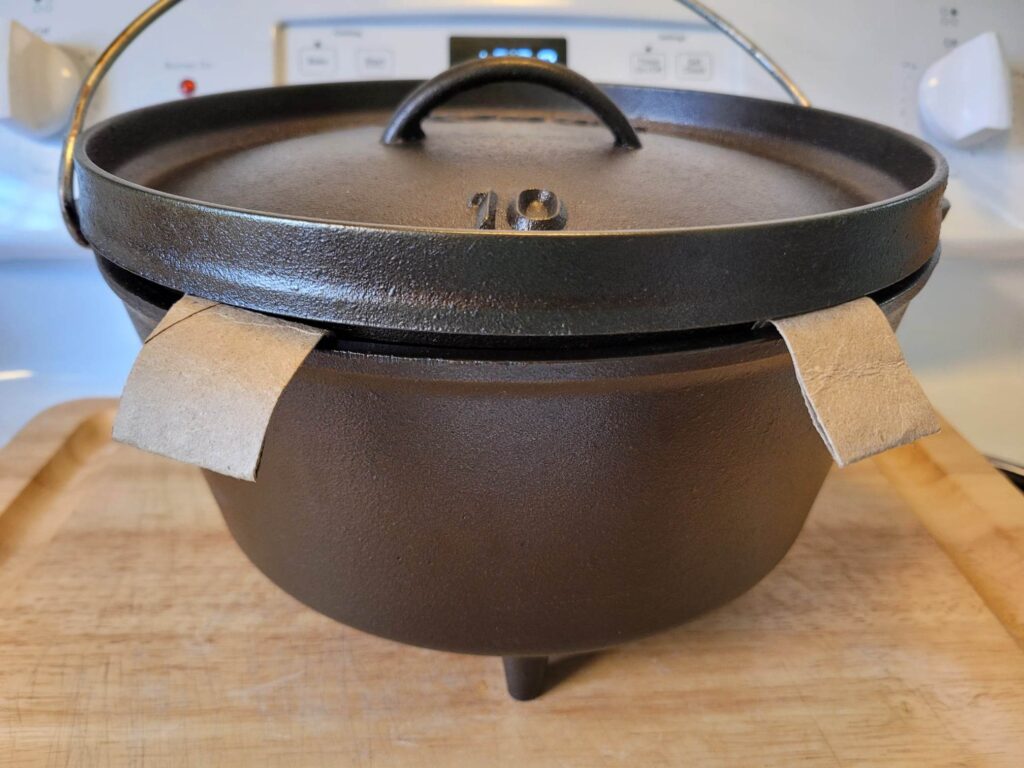
Storage Ideas And Solutions
Here are my favorite ways to store cast iron between uses:
1. Store frequently used skillets on the stovetop. My 12-inch everyday skillet always sits on the back burner of my stove.
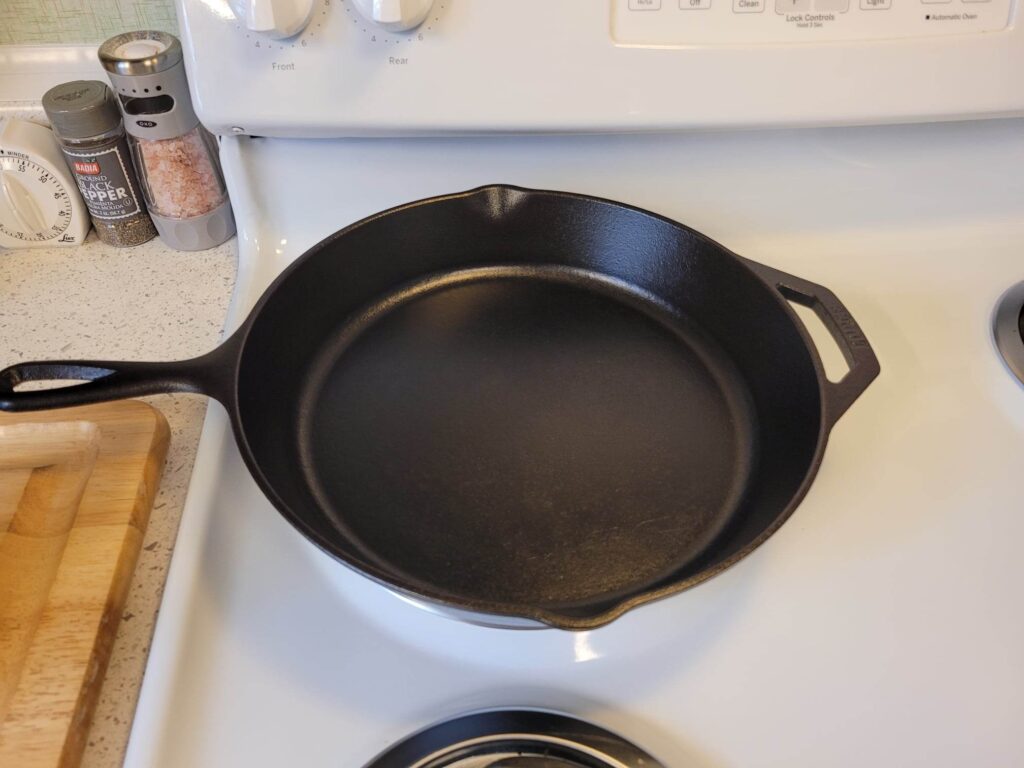
2. Countertop or cabinet cast iron cookware organizers easily hold skillets and lids of multiple shapes and sizes.
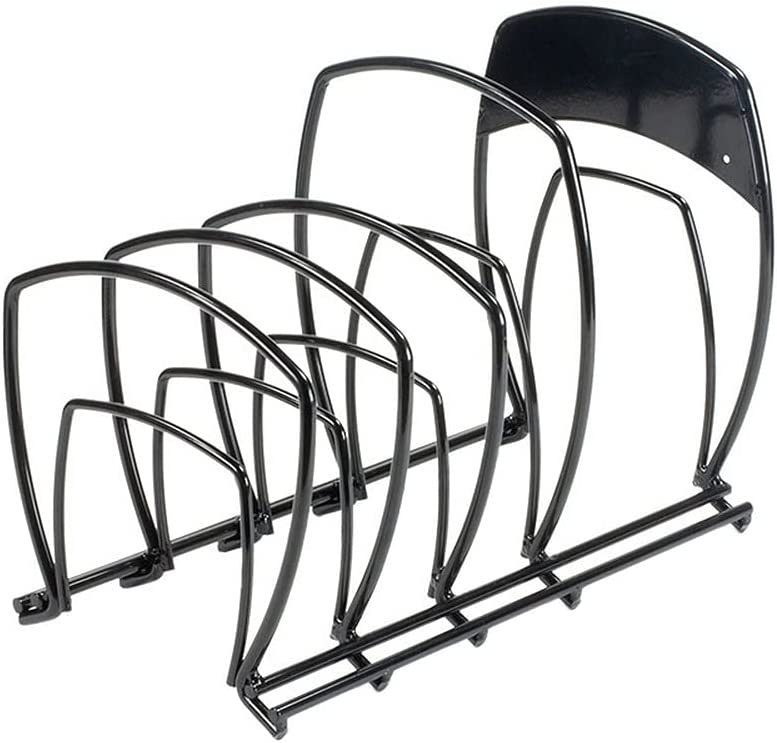
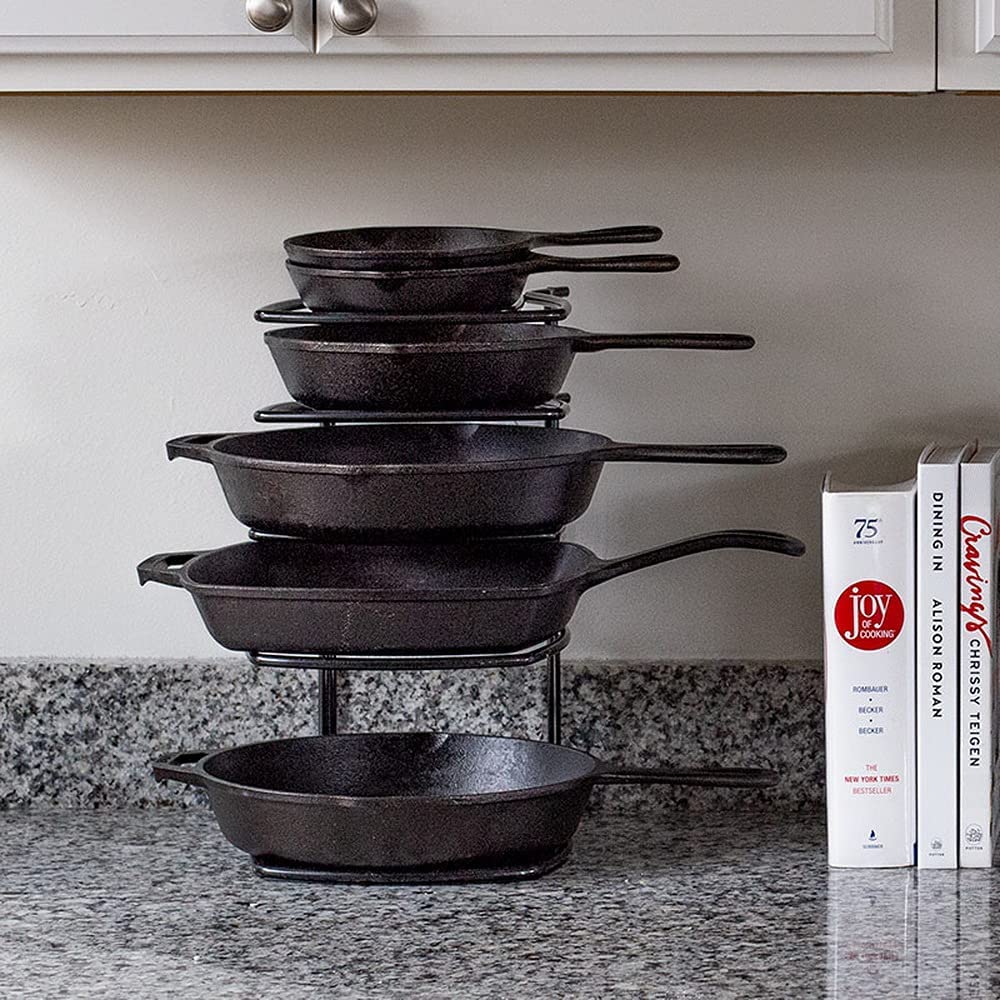
3. The Lodge Cookware Storage Tower is a great option for holding larger pieces, such as dutch ovens and woks. I have this storage tower, and I’ve been quite impressed with the amount of stacked cast iron it can hold.

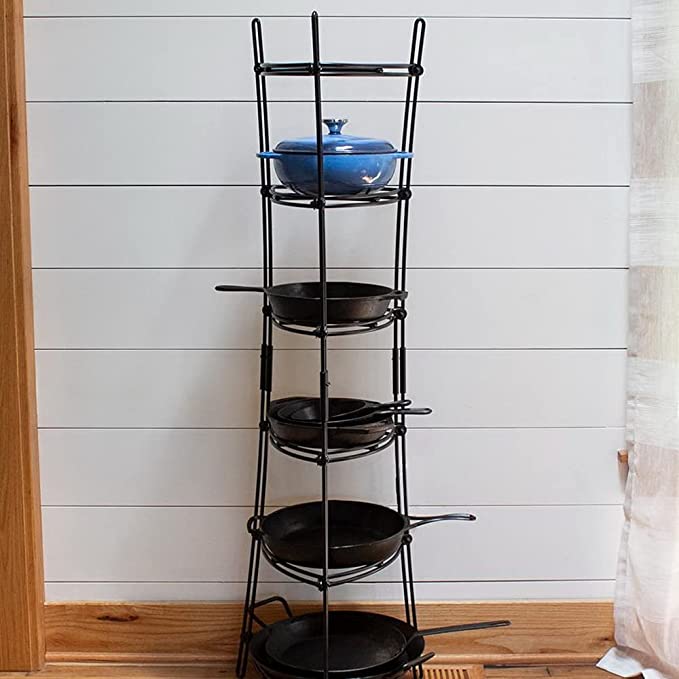
4. Even a sturdy metal shelving unit makes a great place to store cast iron.
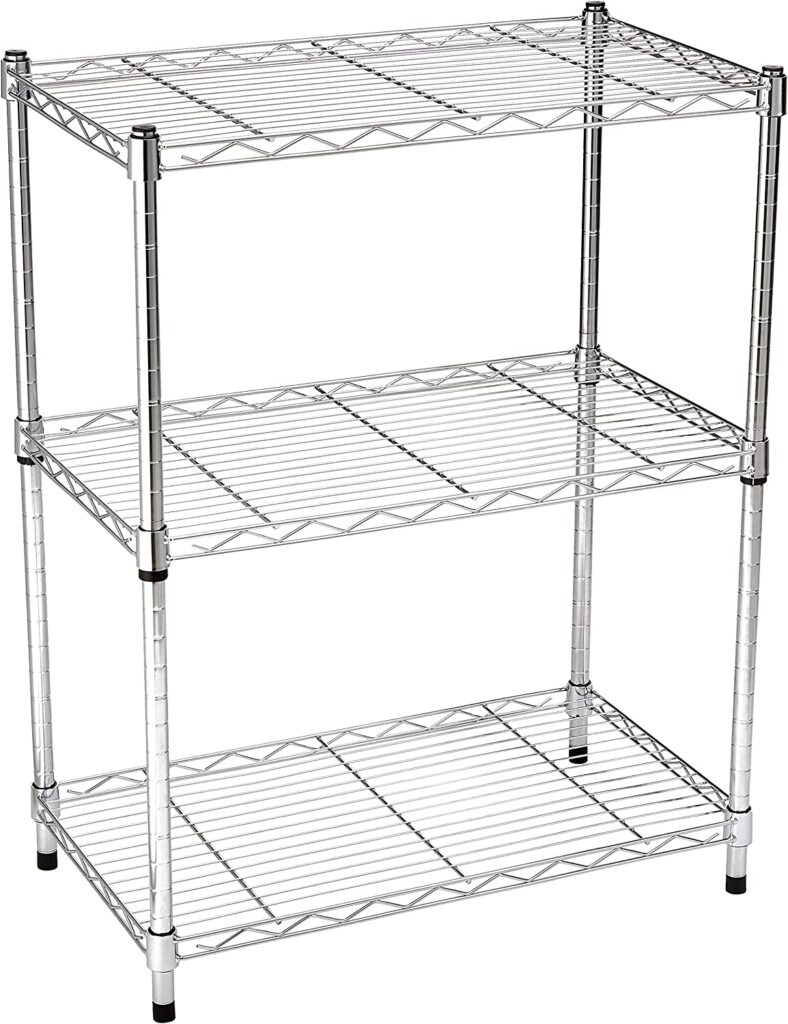
The Safest And Easiest Way To Get Bad Smells Out Of Cast Iron Cookware
Here’s the best way to get lingering food odors and rancid oil smells out of cast iron cookware without damaging the seasoning layer: Wash the pan with mild dish soap and dry it well with a towel. Then, heat it in the oven at 400°F for 15 minutes.
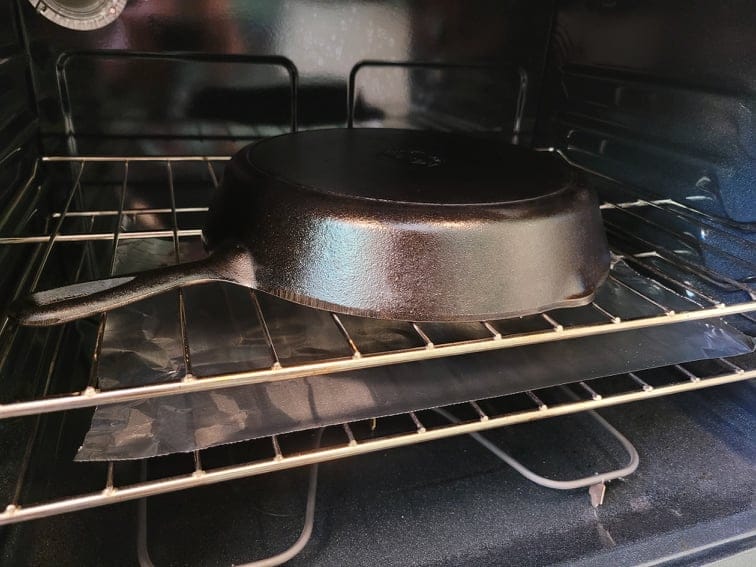
An Alternative Deodorizing Method
You can also deodorize cast iron cookware using salt. Wash the pan with dish soap and water, then dry it thoroughly. Sprinkle a layer of regular table salt all over the dry pan’s cooking surface. Let the salt sit overnight. In the morning, pour out the salt. Rinse and dry the pan, and it should smell better.
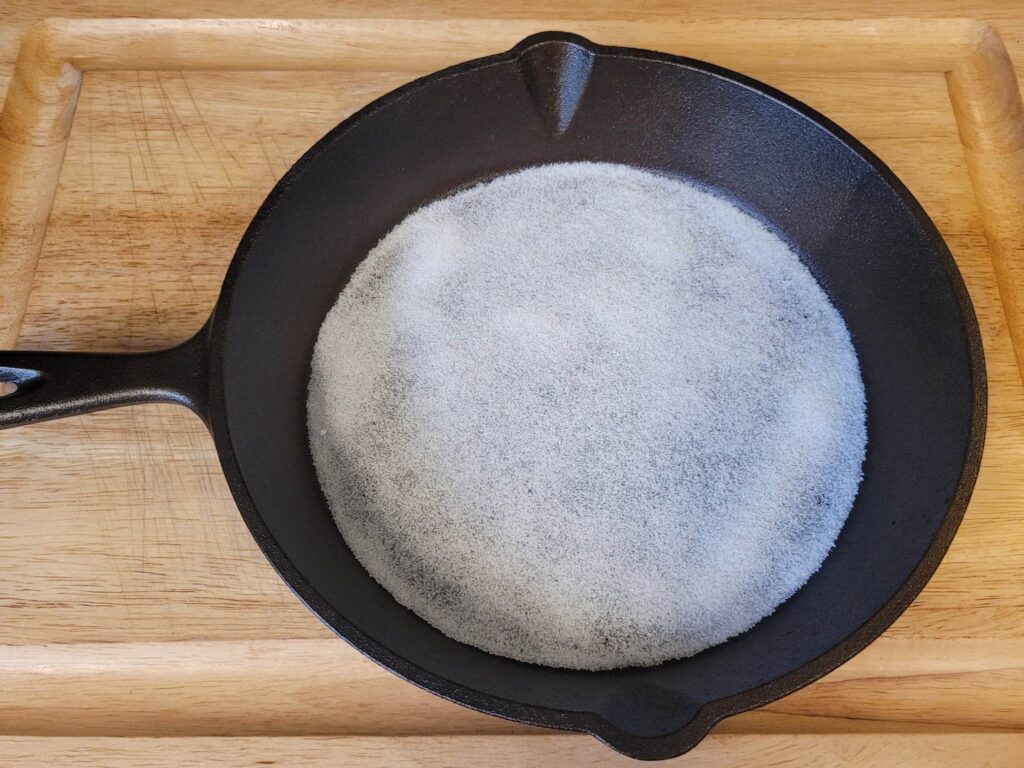
While this method does work, I find heating the pan in the oven works best. The even heat from the oven removes odors from the whole pan, while the salt method only targets the bottom cooking surface and not the sidewalls.
Popular Cast Iron Deodorizing “Hacks” You Should Avoid
Maybe you’ve come across some of these suggestions on the internet or social media. However, I strongly advise you NOT to try these ideas, unless you want to wreck your pan’s seasoning layer and cause it to rust.
1. Don’t boil vinegar or lemon juice in cast iron. Even when diluted in water, they’re just too acidic and will strip away part of the seasoning layer.
2. Don’t repeatedly boil your cast iron pan in another larger pan. This will also wear away your seasoning layer.
3. Avoid soaking your pan for more than about 10 mins. And definitely don’t soak it in vinegar water, or you’ll end up with a rusty mess!
4. I’m not sure where this “hack” originated, but please don’t try to “fry vinegar” for 30 minutes in a cast iron pan then let it sit overnight. Trust me when I tell you your seasoning layer will be absolutely destroyed and your pan will be very rusty.
5. Be careful when trying to “scrub the smell out” of a cast iron pan with a Brillo pad or steel wool. These abrasive wire pads will remove your seasoning layer. If you plan to strip the seasoning off and re-season your pan anyway, this is fine. But if you don’t intend to re-season your cast iron right away, you’ll end up with a rusty pan that won’t perform well.
Summary
In summary, sometimes cast iron pans smell bad for various reasons. After testing several fixes, the verdict is in:
- To remove lingering food odors or rancid oil smells, wash and dry the pan well. Then, heat it in the oven at 400 degrees F for 15 mins. This method is the most effective at removing odors while leaving the seasoning layer intact. If your pan has sticky oil residue that won’t go away after washing, check out this article: Why Is My Cast Iron Sticky? How To Fix And Prevent It.
- If your pan appears rusty or leaves a metallic taste in your food, it’s time to wash and re-season it. You may need to perform the process 2-3 times for a strong seasoning layer. Here are my easy cast iron seasoning instructions.
And that’s it! It’s really quite simple to remove lingering cast iron odors. Now, go forth and cook in your fresh cast iron skillet!
This post may contain affiliate links. This means if you click on a link and make a purchase, I will receive a small commission, at no cost to you, that makes it possible for me to keep the Campfires and Cast Iron site up and running. Please see our disclosure policy for details.
